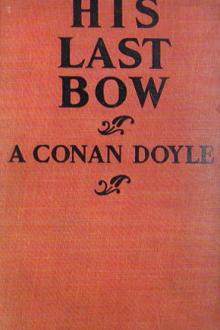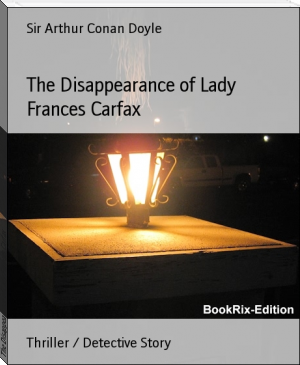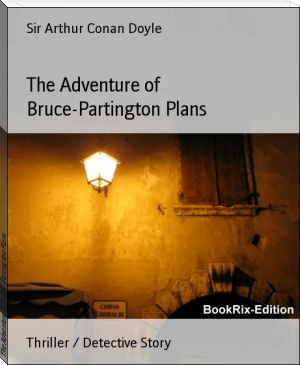His Last Bow by Arthur Conan Doyle (good books to read in english .txt) 📕

- Author: Arthur Conan Doyle
- Performer: -
Book online «His Last Bow by Arthur Conan Doyle (good books to read in english .txt) 📕». Author Arthur Conan Doyle
monotone of colour, broken only by the sharp yellow squares of
the windows and the blurred haloes of the gas-lamps. As we
peered from the darkened sitting-room of the lodging-house, one
more dim light glimmered high up through the obscurity.
“Someone is moving in that room,” said Holmes in a whisper, his
gaunt and eager face thrust forward to the window-pane. “Yes, I
can see his shadow. There he is again! He has a candle in his
hand. Now he is peering across. He wants to be sure that she is
on the lookout. Now he begins to flash. Take the message also,
Watson, that we may check each other. A single flash—that is A,
surely. Now, then. How many did you make it? Twenty. Do did
In. That should mean T. AT—that’s intelligible enough.
Another T. Surely this is the beginning of a second word. Now,
then—TENTA. Dead stop. That can’t be all, Watson? ATTENTA
gives no sense. Nor is it any better as three words AT, TEN, TA,
unless T. A. are a person’s initials. There it goes again!
What’s that? ATTE—why, it is the same message over again.
Curious, Watson, very curious. Now he is off once more! AT—why
he is repeating it for the third time. ATTENTA three times! How
often will he repeat it? No, that seems to be the finish. He
has withdrawn form the window. What do you make of it, Watson?”
“A cipher message, Holmes.”
My companion gave a sudden chuckle of comprehension. “And not a
very obscure cipher, Watson,” said he. “Why, of course, it is
Italian! The A means that it is addressed to a woman. ‘Beware!
Beware! Beware!’ How’s that, Watson?
“I believe you have hit it.”
“Not a doubt of it. It is a very urgent message, thrice repeated
to make it more so. But beware of what? Wait a bit, he is
coming to the window once more.”
Again we saw the dim silhouette of a crouching man and the whisk
of the small flame across the window as the signals were renewed.
They came mor rapidly than before—so rapid that it was hard to
follow them.
“PERICOLO—pericolo—eh, what’s that, Watson? ‘Danger,’ isn’t
it? Yes, by Jove, it’s a danger signal. There he goes again!
PERI. Halloa, what on earth—”
The light had suddenly gone out, the glimmering square of window
had disappeared, and the third floor formed a dark band round the
lofty building, with its tiers of shining casements. That last
warning cry had been suddenly cut short. How, and by whom? The
same thought occurred on the instant to us both. Holmes sprang
up from where he crouched by the window.
“This is serious, Watson,” he cried. “There is some devilry
going forward! Why should such a message stop in such a way? I
should put Scotland Yard in touch with this business—and yet, it
is too pressing for us to leave.”
“Shall I go for the police?”
“We must define the situation a little more clearly. It may bear
some more innocent interpretation. Come, Watson, let us go
across ourselves and see what we can make of it.”
Two
As we walked rapidly down Howe Street I glanced back at the
building which we had left. There, dimly outlined at the top
window, I could see the shadow of a head, a woman’s head, gazing
tensely, rigidly, out into the night, waiting with breathless
suspense for the renewal of that interrupted message. At the
doorway of the Howe Street flats a man, muffled in a cravat and
greatcoat, was leaning against the railing. He started as the
hall-light fell upon our faces.
“Holmes!” he cried.
“Why, Gregson!” said my companion as he shook hands with the
Scotland Yard detective. “Journeys end with lovers’ meetings.
What brings you here?”
“The same reasons that bring you, I expect,” said Gregson. “How
you got on to it I can’t imagine.”
“Different threads, but leading up to the same tangle. I’ve been
taking the signals.”
“Signals?”
“Yes, from that window. They broke off in the middle. We came
over to see the reason. But since it is safe in your hands I see
no object in continuing this business.”
“Wait a bit!” cried Gregson eagerly. “I’ll do you this justice,
Mr. Holmes, that I was never in a case yet that I didn’t feel
stronger for having you on my side. There’s only the one exit to
these flats, so we have him safe.”
“Who is he?”
“Well, well, we score over you for once, Mr. Holmes. You must
give us best this time.” He struck his stick sharply upon the
ground, on which a cabman, his whip in his hand, sauntered over
from a four-wheeler which stood on the far side of the street.
“May I introduce you to Mr. Sherlock Holmes?” he said to the
cabman. “This is Mr. Leverton, of Pinkerton’s American Agency.”
“The hero of the Long Island cave mystery?” said Holmes. “Sir, I
am pleased to meet you.”
The American, a quiet, businesslike young man, with a clean-shaven, hatchet face, flushed up at the words of commendation.
“I am on the trail of my life now, Mr. Holmes,” said he. “If I
can get Gorgiano—”
“What! Gorgiano of the Red Circle?”
“Oh, he has a European fame, has he? Well, we’ve learned all
about him in America. We KNOW he is at the bottom of fifty
murders, and yet we have nothing positive we can take him on. I
tracked him over from New York, and I’ve been close to him for a
week in London, waiting some excuse to get my hand on his collar.
Mr. Gregson and I ran him to ground in that big tenement house,
and there’s only one door, so he can’t slip us. There’s three
folk come out since he went in, but I’ll swear he wasn’t one of
them.”
“Mr. Holmes talks of signals,” said Gregson. “I expect, as
usual, he knows a good deal that we don’t.”
In a few clear words Holmes explained the situation as it had
appeared to us. The American struck his hands together with
vexation.
“He’s on to us!” he cried.
“Why do you think so?”
“Well, it figures out that way, does it not? Here he is, sending
out messages to an accomplice—there are several of his gang in
London. Then suddenly, just as by your own account he was
telling them that there was danger, he broke short off. What
could it mean except that from the window he had suddenly either
caught sight of us in the street, or in some way come to
understand how close the danger was, and that he must act right
away if he was to avoid it? What do you suggest, Mr. Holmes?”
“That we go up at once and see for ourselves.”
“But we have no warrant for his arrest.”
“He is in unoccupied premises under suspicious circumstances,”
said Gregson. “That is good enough for the moment. When we have
him by the heels we can see if New York can’t help us to keep
him. I’ll take the responsibility of arresting him now.”
Our official detectives may blunder in the matter of
intelligence, but never in that of courage. Gregson climbed the
stair to arrest this desperate murderer with the same absolutely
quiet and businesslike bearing with which he would have ascended
the official staircase of Scotland Yard. The Pinkerton man had
tried to push past him, but Gregson had firmly elbowed him back.
London dangers were the privilege of the London force.
The door of the left-hand flat upon the third landing was
standing ajar. Gregson pushed it open. Within all was absolute
silence and darkness. I struck a match and lit the detective’s
lantern. As I did so, and as the flicker steadied into a flame,
we all gave a gasp of surprise. On the deal boards of the
carpetless floor there was outlined a fresh track of blood. The
red steps pointed towards us and led away from an inner room, the
door of which was closed. Gregson flung it open and held his
light full blaze in front of him, while we all peered eagerly
over his shoulders.
In the middle of the floor of the empty room was huddled the
figure of an enormous man, his clean-shaven, swarthy face
grotesquely horrible in its contortion and his head encircled by
a ghastly crimson halo of blood, lying in a broad wet circle upon
the white woodwork. His knees were drawn up, his hands thrown
out in agony, and from the centre of his broad, brown, upturned
throat there projected the white haft of a knife driven blade-deep into his body. Giant as he was, the man must have gone down
like a pole-axed ox before that terrific blow. Beside his right
hand a most formidable horn-handled, two-edged dagger lay upon
the floor, and near it a black kid glove.
“By George! it’s Black Gorgiano himself!” cried the American
detective. “Someone has got ahead of us this time.”
“Here is the candle in the window, Mr. Holmes,” said Gregson.
“Why, whatever are you doing?”
Holmes had stepped across, had lit the candle, and was passing it
backward and forward across the window-panes. Then he peered
into the darkness, blew the candle out, and threw it on the
floor.
“I rather think that will be helpful,” said he. He came over and
stood in deep thought while the two professionals were examining
the body. “You say that three people came out form the flat while
you were waiting downstairs,” said he at last. “Did you observe
them closely?”
“Yes, I did.”
“Was there a fellow about thirty, black-bearded, dark, of middle
size?”
“Yes; he was the last to pass me.”
“That is your man, I fancy. I can give you his description, and
we have a very excellent outline of his footmark. That should be
enough for you.”
“Not much, Mr. Holmes, among the millions of London.”
“Perhaps not. That is why I thought it best to summon this lady
to your aid.”
We all turned round at the words. There, framed in the doorway,
was a tall and beautiful woman—the mysterious lodger of
Bloomsbury. Slowly she advanced, her face pale and drawn with a
frightful apprehension, her eyes fixed and staring, her terrified
gaze riveted upon the dark figure on the floor.
“You have killed him!” she muttered. “Oh, Dio mio, you have
killed him!” Then I heard a sudden sharp intake of her breath,
and she sprang into the air with a cry of joy. Round and round
the room she danced, her hands clapping, her dark eyes gleaming
with delighted wonder, and a thousand pretty Italian exclamations
pouring from her lips. It was terrible and amazing to see such a
woman so convulsed with joy at such a sight. Suddenly she
stopped and gazed at us all with a questioning stare.
“But you! You are police, are you not? You have killed Giuseppe
Gorgiano. Is it not so?”
“We are police, madam.”
She looked round into the shadows of the room.
“But where, then, is Gennaro?” she asked. “He is my husband,
Gennaro Lucca. I am Emilia Lucca, and we are both from New York.
Where is Gennaro? He called me this moment from this window, and
I ran with all my speed.”
“It was I who called,” said Holmes.
“You! How could you call?”
“Your cipher was not difficult, madam. Your presence here was
desirable. I knew that I had only to flash ‘Vieni’ and you would
surely





Comments (0)